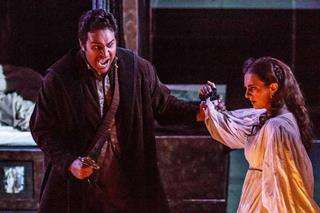|
Back
A Tragedy of Darkness Melbourne
Athenaeum Theatre
10/17/2018 - & October 20, 24*, 27, 2018
Gioachino Rossini: Otello
Stephen Smith (Otello), Elena Xanthoudakis (Desdemona), Boyd Owen (Rodrigo), Henry Choo (Iago), Dimity Shepherd (Emilia), Roger Howell (Elmiro), Paul Biencourt (Lucio), Jason Wasley (The Doge), Michael Dimovski (A Gondolier)
Melbourne Opera Chorus, Raymond Lawrence (Chorus Master), Melbourne Opera Orchestra, Raymond Lawrence (Conductor)
Bruce Beresford (Director), Greg Caroll (Set Designer); John Collopy (Lighting), Rhiannon Irving (Costumes), Liliana Braumberger (Video Artist)

S. Smith, E. Xanthoudakis (© Robin Halls)
It speaks loudly of the courage and vision of Melbourne Opera to undertake the Australian premiere season of Rossini’s Otello 202 years after its first production in Naples. Courage, in that the opera requires no less than six tenors, breaks many operatic conventions in structure and content, denies the protagonists a love duet and ends in the bleakest tragedy. Not the usual fare by any means and not an opera with wide appeal. Vision, in that Melbourne Opera have set themselves the task of becoming a pre-eminent presenter of the bel canto repertoire in this country, bringing rare and difficult works to the public, frequently for the first time.
It makes perfect sense that the company would entice Melbourne born soprano Elena Xanthoudakis home from her developing career in Europe to tackle the demanding role of Desdemona. She created a powerful Maria Stuarda in 2015 and a towering realisation of Anna Bolena (another Australian premiere) in 2016 and her performance in this production of Otello captures the spotlight perfectly. It is informative to note the extent to which Ms. Xanthoudakis has developed her stage presence and voice in the intervening years. Despite the plethora of tenors and the soaring duets and ensembles in this piece, the evening is all hers, pivoting on her galvanising delivery of the Willow Song in the final act.
Rossini wrote the role of Desdemona for Isabella Colbran his lover and muse. For her, he featured hugely difficult plunges into the darkest notes of the chest register and demanding flights to the heights of her legendary upper reach. Soprano Elena Xanthoudakis has the vocal ability and technique to mould her voice to the demands of this mezzo role while unceasingly showcasing the very beautiful clarity of her high notes. She executed flawless coloratura, the demanding leaps from one register to another and coloured the emotional turmoil of the character with apparent ease. Clearly a role this challenging has no easy features but Ms. Xanthoudakis brings a serenity to the stage which allows total focus on her vocal abilities and the character she is creating. She is a highly accomplished performer whose career will doubtlessly continue to blossom.
The range of tenor voices for which Rossini wrote this opera reflects the extent of the talent among the men in Naples in 1816. The role of Otello requires a darker, richer voice, while his rival Rodrigo has a more brilliant upper range and the evil Iago varies his reach to meet the mood of his transactions with the previous pair. Rossini has melded these roles into a huge array of solo and ensemble pieces, frequently featuring duets which underline the absence of any love duet for the two leading characters. The strength of this production rests heavily on the abilities of the men to interact, combine and separate in the many convoluted musical numbers. As Otello, Stephen Smith presents a formidable stage presence. His voice is at its strongest when matched with others, yet he tackles the many fearsomely strenuous solos including the extensive and often scarcely-accompanied recitativi with power and commitment.
The role of Rodrigo is as arduous as it is lengthy and Boyd Owen meets the challenge with stamina and style. As the manipulative Iago, Henry Choo is a perfect villain, drawing well-deserved good-humoured booing from an appreciative crowd at the curtain calls. He openly transforms his character using his extensive vocal range to colour his “friendly” advice, self-serving manipulations and conniving plots. Of the other male roles, Elmiro, the pitiless father of Desdemona is the more substantial. Roger Howell gave a fine performance, which showed special beauty in combination with Ms. Xanthoudakis in their early duet.
The only other female character Emila is ably portrayed by Dimity Shepherd. She has a strong stage persona and her voice blended beautifully with Desdemona in the first act duet. Ms. Shepherd delivered a fine portrait of the devoted confidante with strong acting and passionate singing.
It is something of a coup for Melbourne Opera to secure the services of internationally acclaimed Australian director Bruce Beresford. He brings a wealth of experience in film and opera to the company with a light directorial hand which throws the emphasis directly onto the race-relations elements of the plot. This is perhaps the most pertinent aspect of the opera’s libretto to a modern audience; drawing gasps as Otello is referred to as an “upstart Moor”, and unwelcome “black”. Mr. Beresford has enabled librettist Berio’s somewhat hacked reinvention of Shakespeare’s play to attain a level of modernity and relevance by concentrating on prejudice, insult and injustice. He combines this with a strong emphasis on Otello’s essential character flaw: a deep resentment of his origins despite his protestation that he “is a proud son of Africa”.
Designer Greg Caroll has devised a single set of black marble in floor and columns. Projections of old master paintings of Venice dominate the rear wall suggesting interiors as well as extended vistas over the canals and lagoon. These projections are highly effective in the sword fight confrontation between Rodrigo and Otello as they rove across details of battle scenes drawn from old paintings and in the transformation of the night sky during the final act.
This production marks Melbourne Opera as inventive, experimental, risk-taking and daring. The company deserve support for their efforts, entirely without the benefit of government subsidy and offering opportunities to performers and audience alike.
Gregory Pritchard
|